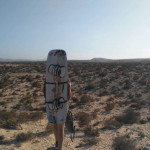
Interview with Mehmet, a nomadic digital maker and entrepreneur
How did you get started with remote work?
My last formal tech startup business I was running five years ago was in transition to take client work. We were lucky to land a very large fashion retailer client managing luxury fashion brands, and their tech stack required a new set of team members.
We started working with a lot of remote work professionals. This started a shift in our team management model, communication framework, and eventually ignited the adaptation of a workspace free mindset.
We were also traveling more often both for business purposes as well as casual house swaps and month-long tryouts in different cities in the US. It was a weird period, but we went through it to redefine a lot of things in how we work.
Read 114 answers from other remote workers
What are you working on?
My team and I are currently working on a few projects for clients varying from real estate development to fashion. We are process nerds and we continuously build stuff for ourselves.
We started to package some of these tools and open them up to the rest of the world as both open source projects and some free tools we’re planning to launch soon publicly. We’re really excited to help small to medium, remote teams like us with these tools.
Read 107 answers from other remote workers
How do you stay on task?
Disconnect as much as you can. Go offline, if possible.
In this always-connected era, all of our tools require connectivity. As an engineer, I always try to have my development environments somewhat offline-ready. This step allows me to do some creative work or bootstrap some mini-tool for myself while I take a flight. This also helps if I have bad WI-FI in a weird location (like up in the mountains) or a coffee shop.
To me, the best productivity is when I am “not communicating.” As remote-teams, we tend to go heavier on “communication” and put importance on “presence.” This can be a big enemy for productivity and focus.
Read 100 answers from other remote workers
What do you like about remote work?
Owning my own time. I absolutely love to be able to shape my own week and days. I often take a yoga break in the middle of the day. I often stay screen-less on Fridays (just pen and notepad). Sometimes I attend to my kids in the middle of the day and work later in the evenings.
We don’t have formal work hours in our company. The only single thing on the calendar everybody is asked to attend is a 5-10 minute daily standup.
We generally do the traditional standup format in a very light and fast format like 5 minutes (under a minute per person if nobody is blocked), and almost always go over the 10-minute mark just because someone opened or drag the conversation to something in their lives.
Read 106 answers from other remote workers
What do you not like about remote work?
Less concentrated physical time together. We try to conduct company retreats but they are rare. Often we get too excited about some ideas and I find myself thinking, "oh man, only if we were together so we would pull a hackathon, or weekend trip together to just design and code for some fun project and have a good time together as a team."
Logistically, it becomes hard to bring the team together.
We’re a small team and not making tons of profits, but whenever we do a large project and have some budget, team retreats are the very very first thing we try to plan.
Read 103 answers from other remote workers
What tools do you use to stay productive?
The most helpful productivity trick I do is, I try to stay in the browser. Using native apps gives too much freedom to the tools being unnecessarily distractive with their notifications. I use Slack, emails even sometimes coding work within the browser versions.
I used the Focus app and also used Stretchly to tame my distractive brain while I work. I believe most of us don’t have the discipline to not respond to a message we receive or lose ourselves in the depths of the internet.
I used to do more rigorous GTD techniques like Pomodoro, or tried half of the to-do apps in their different versions and eventually landed on keeping my to-dos in simple text files (super portable between devices) and without trying anything special.
I try to define my highlight for the day and focus on one single great task to finish, and that’s it.
Read 108 answers from other remote workers
How do you use these tools?
I’m generally an organized person, both physically and digitally. I try to over-document my process, plans, to-dos. But eventually, I have to respect the number of hours I have for work and other things in my day.
At the end of the day, everything comes down to my calendar view in my head (not everything is in the calendar, but there are “blocks” of time for different purposes).
Any tool I use comes down to the idea of how that tool will support my calendar or daily thinking. If it helps directly, then that’s the best tool for me.
If it’s helping me organize my to-dos, files, or emails, they are smaller incremental tools that I use to try to optimize my sub-processes.
One thing I try to be aware of (and sometimes fail) is when to “close” a tool, and only I can decide to open it back. I don’t like the idea that a tool reminds itself or, even worse, opens itself without my permission. That’s why I like browser-based versions of the tools.
Read 9 answers from other remote workers
Where do you conduct your work?
Our team is super distributed in multiple timezones in the US and in Europe. So I find myself taking calls in weird hours (especially when I travel to the west coast). I generally work from co-working spaces.
I’m a member of one that has 10 locations in Manhattan (NY) and Brooklyn, where I reside. I often bounce around different locations depending on how my week/day goes.
Read 15 answers from other remote workers
What about your space helps you to be productive?
I love coffee shops as much as I love working from co-working spaces. If I don’t have a lot of conference calls (I almost exclusively take calls instead of in-person meetings if I can avoid), I like to sit, work and change scenery to different coffeeshops.
In my opinion, being around a crowd creates more inspiration and, weirdly, more focus.
I stay in my co-working space desks longer hours if I’m working on hands-on engineering or design work with my teammates.
Read 15 answers from other remote workers
What does your workday routine look like?
I’m an early(ish) riser. I have two 2-year-old kids. They wake up at 6 am sharp. So I stop using alarms. Generally, a short time spent with them follows with dropping them off to daycare then I sit on my desk between 8-8:30 am.
That gives me roughly half an hour before my team stand-up (half of our team is in Europe). We don’t do stand-ups on Fridays, so Fridays are generally very quiet on our communication channels.
I personally work longer hours on Mon-Thu and try to keep Friday as my “thinking” day, where I try to stay away from attending to work-related stuff. I experiment and play with things a lot on Fridays.
As a team, we try to keep Mondays for a planning and week kick-off day, so there are generally few meetings between team members to discuss stuff for the week.
We have a rule not to have any team-wide meetings on Tuesdays and Wednesdays. We call it “quiet” days. People can completely disappear the whole day after stand-up if they want.
Most people are offline these days, and the expected reply time is about 1-2 hours.
Thursdays are generally our big day, where we close a week cycle sprint and plan the next one. So we have sub-team based meetings (separate engineer and design team recap and have meetings to plan the next sprint).
This allows Fridays to be more standalone (everybody can personally digest what’s coming in that sprint and do research, and experimental work). By Monday morning, everybody knows the plan, and we generally have a light kick-off meeting repeating what’s planned for that sprint.
Read 16 answers from other remote workers
How do you decide priorities?
I’m actually not good at identifying my priorities well. I often find myself spending too much time on one thing that may not be the absolute best thing I should spend my time on.
I tried a few different techniques for this. The usual urgent/not urgent, important/not important matrix translated into an Airtable sheet where I scored each task/initiative with different factors and had some formulated mechanism to determine the priorities for the upcoming day/week.
Eventually, all of these methods fade out for me. Right now, for long, I’ve been using a “highlight” of the day approach where I pick only one thing to accomplish for the day. It sounds like an underperforming approach, but I don’t pick 15-minute tasks for the highlight of the day. They are generally high level and more like milestones than tasks.
And naturally, a lot of related ”tasks“ follow or are bundled together as one big ”accomplishment“ like ”submitting a proposal to X“ or setting a team-wide goal that I try to supervise like ”go live with v2.0 for project Z.“
Read 40 answers from other remote workers
How do you avoid burnout?
To me, burnout comes when you do the same thing too often and too intensely.
I found the solution in two things that breaks both the frequency and the intensity of what I do that may cause burnout. One of them is making your body physically active. This is different for everybody.
For me, staying physically active involves things that occupy my brain’s active state. This could include things like skiing, ice hockey, basketball, and yoga.
I’ll give an opposite example. I used to swim super early in the mornings. Swimming is an amazing workout, but it becomes very automatic after some time.
For me, swimming is not a kind of activity that drifts my mind to other things than what I was working on. I actually think more about what I was doing, and it takes me back to the overwhelmed state of the work.
The second thing that worked well for me was finding something that was inspiring me. This can be in many different forms. Sometimes, seeing a live performance, reading a biography, or going to an art exhibition can accomplish this. For you, this may look like spending time with inspiring people.
So, find what will get you active and get inspired when you take a break. My long time go-to thing for me is an intense, fast-paced yoga class that resets me.
Read 17 answers from other remote workers
What is the best advice you have ever received?
Learn to delegate effectively. This is not something that I have achieved well yet, but I’m hungry to perfect this skill. It may take a few decades until I do. The most recent time that I recall hearing this suggestion was from Kevin Kelly’s 3-hour interview with Tim Ferris and Richard Branson’s Losing my Virginity autobiography I read many years ago.
Read 16 answers from other remote workers
What do you look for when you hire a remote worker or freelancer for your team?
I always seek out great learners and adapters. We are working in an industry where everything changes and dates itself within a few years. So just knowing something becomes less important if you are not hiring a dev-ops that will take care of more sensitive parts of your business that require proven expertise and knowledge.
But for the rest of the team members, we work with; we almost never look for academic credentials. I often look for their enthusiasm for their personal projects. I pay a lot of attention to people's public work (Github, Dribbble...).
Even though someone is lacking skill, they may be great learners like the rest of our team members. Ultimately, all we want to know and see is that they have what it takes to "solve" a problem. As corny as it sounds, I love the famous Mike Tyson quote "Everybody has a plan until they are punched in the face".
Doing any practical work like software development or digital production is full with obstacles. So you get many punches every day. We need people that will try until they make it work. This requires the skill of learning and being adaptable rather than knowing X coding language or Y design application.
Another important criteria are if they are a cultural fit.
I've been running startups and small teams for a long time now, and this question was one of our "startup hire" criteria when we discuss a candidate with my business partners.
Is this a person I'd like to hang out with?
Eventually, you are looking to work with someone who shares similar values with you about your work style. This is required because you will be spending a lot of time together when you work regardless of if they are on-site or remote.
You will have to problem-solve and complete goals together. So you have to share enthusiasm and excitement as well as the burdens of your work (staying late to fix a problem). The journey we're taking together has to be fun, and involve a collective effort. Ultimately, you want to spend your time with people you feel comfortable with.
Nobody wants to talk (or worse "deal with") someone they don't like. So we promote the discussion of a lot of non-work related topics on our Slack channels. They could include topics about reading, music, personal life goals, travel stories, and other stuff.
Read 7 answers from other remote workers
What are you looking to achieve in the next five years?
To form and build our community of creatives, engineers, and makers around the tools we build while also helping the remote workforce grow.
Read 11 answers from other remote workers
What advice would you give to a new remote worker?
Learn your unique ways to feel “connected. “ The remote work style’s biggest disadvantage is loneliness. It requires remote workers to be a little more extroverted.
You have to become more vocal (mostly with written communication) in the work environment. You can also surround yourself with other remote workers in co-working spaces or public places like coffee shops.
Whatever helps you feel like you are being social, identify those opportunities. Humans are social creatures, even if you are a super introvert.
Read 13 answers from other remote workers
What advice would you give to a remote jobseeker?
Make your knowledge as publically visible as you can. Create open-source software if you are a developer. Also, blog, write or create Youtube videos about what you are currently learning.
If you are a designer, fill up your Dribbble profile with your work. If you don’t have enough work, work for free and make it public. Another great way to create public work and showcase your capabilities is to develop or opt into design challenges.
Be more social online. Join the conversation.
Read 8 answers from other remote workers
What did we forget to ask Mehmet?
At RemoteHabits we're always trying to improve our interviews, what question should we have asked Mehmet?
Biography
Mehmet
I’m a nomadic digital maker from (and home-based) Brooklyn, NY. I run a small creative team producing any digital experience we get our hands on.
Work remotely? Share your story on RemoteHabits!
Want to be interviewed? If you have a remote position, head over to the interview me page!
Looking for a remote job?
RemoteHabits Jobs has everything you need to find your next great remote work position!
Related Interviews
Company Interview with Ivan, CEO of Base B
Ivan's company, Base B helps companies build effective remote teams. See the tools and training practices that allow them to excel in helping their clients.
Interview with Celine, a VP of People Ops and remote team member
Celine has experienced the highs and lows of working with remote and hybrid teams—see her tips for thriving as a member of a remote team.
Interview with Patryk, a Front-end Developer & UI Designer
Patryk has learned that there is no reason to wait for the flow - once you start working, it will happen naturally.


